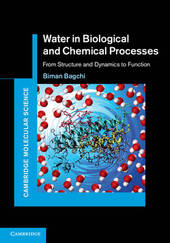
|
Water in Biological and Chemical Processes: From Structure and Dynamics to Function
Hardback
Main Details
| Title |
Water in Biological and Chemical Processes: From Structure and Dynamics to Function
|
| Authors and Contributors |
By (author) Biman Bagchi
|
| Series | Cambridge Molecular Science |
|---|
| Physical Properties |
| Format:Hardback | | Pages:374 | | Dimensions(mm): Height 252,Width 179 |
|
| Category/Genre | Inorganic chemistry
Molecular biology |
|---|
| ISBN/Barcode |
9781107037298
|
| Classifications | Dewey:546.22 |
|---|
| Audience | | Professional & Vocational | |
|---|
| Illustrations |
5 Tables, black and white; 9 Plates, color; 127 Line drawings, unspecified
|
|
Publishing Details |
| Publisher |
Cambridge University Press
|
| Imprint |
Cambridge University Press
|
| Publication Date |
14 November 2013 |
| Publication Country |
United Kingdom
|
Description
Building up from microscopic basics to observed complex functions, this insightful monograph explains and describes how the unique molecular properties of water give rise to its structural and dynamical behaviour which in turn translates into its role in biological and chemical processes. The discussion of the biological functions of water details not only the stabilising effect of water in proteins and DNA, but also the direct role that water molecules themselves play in biochemical processes, such as enzyme kinetics, protein synthesis and drug-DNA interaction. The overview of the behaviour of water in chemical systems discusses hydrophilic, hydrophobic and amphiphilic effects, as well as the interactions of water with micelles, reverse micelles, microemulsions and carbon nanotubes. Supported by extensive experimental and computer simulation data, highlighting many of the recent advances in the study of water in complex systems, this is an ideal resource for anyone studying water at the molecular level.
Author Biography
Biman Bagchi is a Professor at the Indian Institute of Science, Bangalore. He is a Fellow of the Indian National Science Academy, the Indian Academy of Sciences, The National Academy of Sciences, India, and TWAS, the academy of sciences for the developing world, Italy.
|